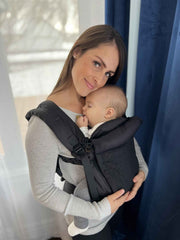
The birth of your first born baby is also the start of your family. That’s not a small thing! It’s such an intense and unique adventure to learn to become parents and to discover head-first this new incredible role. Learning to know your baby, to understand him, and to take care of him. To get the impression that you often lack the knowledge that you need and you’re never quite sure of what you’re doing.
With the arrival of a second baby (and the following ones!), you’ll need to find a new rhythm for your family, give everyone some time to adapt, and live a whole new dynamic with tiny humans, each with needs and a personality of their own!
Each step, as agreeable and magical as they might be, comes with its own lot of questions, challenges, worries, and often enough, stress and fatigue.
Here are a few suggestions to simplify your day-to-day life and allow you to live your parenthood more gently.
1. Do your research, but without overdoing it.

Several parents have a tendency to read everything, watch everything, listen to everything and look up everything they can in terms of information. They compare different approaches, for example, regarding children’s education or sleep schedule. They turn to many experts in the same field who talk about the same subject from different angles in the hope to reassure themselves that they won’t miss some critical piece of information.
This approach can send you in a downward spiral of anxiety and confusion. It might make it difficult for you to make your own mind, make decisions, and most importantly to follow your instincts, as they become bogged down with a ton of information.
This is why it’s so important to choose your sources. Find professionals whose values are similar to your own, and most importantly to trust yourself. Although your emotions might make you believe that you don’t have what it takes, you’ll always be the one who knows your child the most, and deep within your heart you always have an answer to your own questions and doubts.
All in all, it’s good to be informed to make good choices. Being over-informed, no.
2. Avoid comparisons.

Friends, family, social media… There are so many opportunities to compare ourselves and sometimes, without us even realizing the impact the habit can have on our mental health.
Comparisons can create the need to change at all cost, can uselessly put pressure on parents and even breed in them a sentiment of incompetence. Some parents even go against their own values in the name of conformity and do ‘’what seems to be working for other people’’.
What if, instead of comparing yourself, you could draw inspiration from others?
What if, when you realize that another parent does things differently, you took a deep breath and the time to ask yourself whether this person could become a source of parenting inspiration (instead of being one more reason to be your own worst critic!). What lesson can you take from this person or that situation? How can you grow as a person, while being empathic and gracious toward yourself?
Can you feel how different that energy is? Taking inspiration instead of comparing ourselves. To evolve instead of demeaning ourselves.
3. Make babywearing your ally!

Babywearing has as many benefits for the parents as it does for the babies, and it’s very handy throughout the day. Too many parents forget that they have the option and only use their baby carrier or wrap when going out.
Your baby is fussy? Sick? Tired? Carry him.
Your baby doesn’t want to sleep by himself during daytime? Another child needs your attention, but your baby won’t leave your arms? Carry him.
Your baby quickly becomes impatient when you put him on a play mat, in a swing or a high chair? Carry him!
With physiological babywearing, there’s no problem with doing it as often as you want or as often as your baby needs.
On top of that, it’s been proven that carried babies cry less and that the technique promotes, among other things, sleep. A calmer baby that sleeps better, that’s something we all like!
4. Simplify the bedtime routine.
Aim for a routine that’s simple, somewhat short and easily adjustable. When your child is very tired, this flexibility and simplicity will be a godsend. A bedtime routine that takes too much time or has too many rigid steps can become tiresome for both the parents and their child.
Furthermore, a routine that takes too long might mean missing that famous ‘’sleep train’’ for your child… and having to wait for ‘’the next one’’ before he finally goes to sleep. We all know it: a child who’s too tired is cranky and has restless sleep afterward.
Why not give a bath every other night whenever possible? Especially with newborn babies! It’s absolutely not necessary to bathe them every day.
Do you like to sing to soothe your baby? Read stories? Would it be possible, then, to limit yourself to one song and to have different stories on hand, including some of very short ones?
There are many possibilities to simplify your bedtime routine. It’s up to you to find how to shorten or soften yours!
5. This isn’t about perfection!
Your meals can be quickly put together, simple on most days and repeated often.
Your house cleaning doesn’t need to be done as often or as thoroughly as before.
There will always be tiny fingerprints in your windows (and sometimes even mouth prints!).
For a few years, there’ll be toys in your living room.
There’s a possibility that your clothes will wait a few days before they get folded and put away.
You have the right to choose to play with your kids instead of doing the dishes.
You also have the right to choose to do the dishes instead of playing with your kids!
You might need help more often than before.

In the end, perfection is…
Making choices for your own mental health.
Recognizing, taking into consideration and stating your limits.
Getting things done easily some days and sometimes feeling like you’re getting nowhere the next day (or even the next minute!)
Is this getting you motivated? What kinds of choices will you do to make your day to day easier?
My name is Andréane Loubier, I am the mother of 3 wonderful boys, a doula since 2013 and a certified babywearing instructor since 2016. I'm convinced I'll be having a lot fun chatting with you throughout the weeks over Facebook and Instagram, the main platforms where I'll be sharing my thoughts with you on babywearing, of course, but also on other subjects around perinatality.


Share:
4 Tips to Demystify Babywearing Facing Out
How to Spend Time Outside With Your Baby This Winter (And Actually Enjoy It)